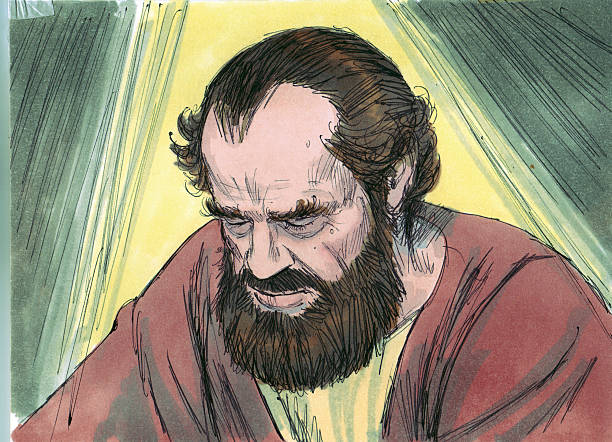Acts - Chapter 9 Saul's Conversion
This chapter gives the details of Saul's conversion to Christ on the road to Damascus, and his experiences that followed. This chapter closes with Saul going back to Tarsus for several years and the scenes then turn to the Apostle Peter as he travels around Judea to minister the Gospel of Jesus Christ.
Saul of Tarsus

We left chapter 8 with Saul of Tarsus, a young eager talmadin (disciple) of Gamaliel (the great Rabbinical Pharisee) who received permission to go house to house arresting followers of Jesus, whom the Sanhedrin Council despised. These followers of Jesus were fleeing Jerusalem in groves for fear of being arrested, imprisoned, or possibly killed. They were relocating to other cities throughout Judea, Galilee, Samaria, Damascus and even as far as Antioch to avoid persecution.
Saul the Talmedim
Saul was not old enough to become a full-fledged Pharisee at this time, as he was only 26 years at this time, and only the talmedim of a recognized rabbi could advance into ministry as a Pharisee. To be in ministry, however, a trained talmedim had to be at least 30 years of age. Until then, Saul remained as a talmedim (disciple/student) until he was of the age to be allowed to enter into the ministry.as a Pharisee, with all its privileges. While in training, Saul did all he could to advance himself to gain favor with the Sanhedrin Council.
Then Saul, still breathing threats and murder against the disciples of the Lord, went to the high priest and asked letters from him to the synagogues of Damascus, so that if he found any who were of the Way, whether men or women, he might bring them bound to Jerusalem.
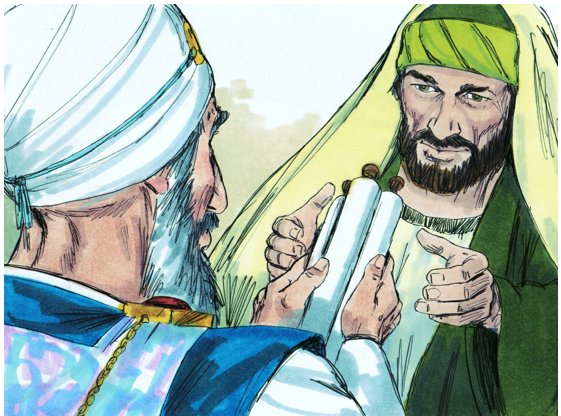
"The Way" Name Given to the Followers of Jesus Christ
Most of the followers of Christ (people of the Way) throughout Jerusalem were either in prison, dead, or had fled the city. As such, Saul still wanting to arrest more of these believers, needed to go outside of the city to do so. Eager to advance himself in ministry, he then went to the high priest, asking for letters to the synagogues of the city of Damascus to have them arrested, bound and brought back to Jerusalem and placed in prison. Eager to get rid of these people of the Way, the Sanhedrin Council gave permission to Saul, with letters to the local synagogues in Damascus to have them arrested. Saul then gathered a troop of soldiers, armed with locks and chains, to bring these people back to Jerusalem to put them in prison.
The Damascus Road
There are a number of reasons to believe that Saul and the soldiers traveled on foot instead of on horseback, which will be explained shortly. The distance between Jerusalem to Damascus was around 135 mile, which would take about six days on foot, depending on which road was taken. Since a Jew always rested on the seventh day of the week, traveling would probably begun on the first day of the week and ended on day six, traveling about 23 miles per day.

Saul's Conversion
As he journeyed he came near Damascus, and suddenly a light shone around him from heaven. Then he fell to the ground, and heard a voice saying to him, “Saul, Saul, why are you persecuting Me?” And he said, “Who are You, Lord?” Then the Lord said, “I am Jesus, whom you are persecuting. It is hard for you to kick against the goads.”

As they were approaching Damascus, a blinding light like a spot-light (even during the day) suddenly shone all around Saul. Saul became very startled to where he fell helplessly to the ground.
He then heard a voice speak to him saying: "Saul Saul, why are you persecuting Me?" Saul immediately knew it was the voice of diety and replied: Who are You, Lord," recognizing it to be a voice of authority over him. The voice came back, "I am Jesus, whom you are persecution. It is hard for you to kick against the goads."
Kicking Against the Goads

Even though Saul believed in God, following the Mosaic Law, he, in his zealousness to please the Sanhedrin Council, gaining favor with them, had consented to Stephen's martyrdom, arrested many believer, and killing some. Then he made things worse by going to Damascus to round up more believers to have them arrested or killed as well. He would have continued had God not stopped him.
Saul is now helpless, knocked to the ground, and Jesus spoke out to him in a loud voice telling him that he can't keep resisting the pleadings of the Holy Spirit. Things would have only gotten worse. Saul's conscience had been strongly refusing the convictions of God's Spirit since the death of Stephen (Acts 8:1), and now he is flat on the ground face-to-face with Jesus to answer for what he has done.
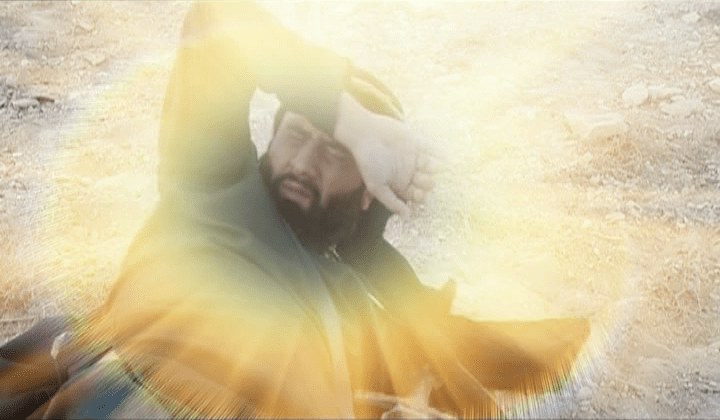
6 So he, trembling and astonished, said, “Lord, what do You want me to do?” Then the Lord said to him, “Arise and go into the city, and you will be told what you must do.” 7 And the men who journeyed with him stood speechless, hearing a voice but seeing no one. 8 Then Saul arose from the ground, and when his eyes were opened he saw no one. But they led him by the hand and brought him into Damascus. 9 And he was three days without sight, and neither ate nor drank.
Stupified with fear and trembling, as the Greek meaning has it, frightened Saul spoke back to asked, "Lord, what do You want me to do?" Jesus simply gave him instruction to go into Damascus and he would be told what he needed to do. Those instruction were ambiguous to say the least, leaving Saul not knowing what his fate might hold. All he knew at this point was that he was scared, coming to the realization that he had sinned terribly against God, now recognized that Jesus is God - his ultimate authority over him, and he lay there helpless.
The soldiers with Saul saw the light, seeing him pinned to the ground, heard a noise resembling a voice, not recognizing the words, but saw no one. Saul, on the other hand, heard every word that Jesus spoke out. A voice he would always remember! As the startling light disappeared, Saul finally opened his eyes only to discover he was now blind - and very much afraid. If they were on horseback, the soldiers could have easily put Saul on a horse. Instead, he was led by the hand from one of the soldiers as they finished their journey into Damascus.
Where did they know where to go into Damascus? As brought out earlier in this chapter, a Jew always rested on the Sabbath. If they traveled for six days, they were now approaching the seventh day - the Sabbath. Prior arrangements would probably have been made at the house of Judas for lodging. There Saul laid helpless without food or water for the next three days as the Lord dealt internally with him. Paul was being radically changed to be a believers in Jesus Christ and being prepared for the ministry that God had planned for him.
Ananias Baptizes Saul
In the meantime, God was dealing with another disciple in Damascus who loved the Lord named Ananias who would play a part in the conversion of Saul.
10 Now there was a certain disciple at Damascus named Ananias; and to him the Lord said in a vision, “Ananias.” And he said, “Here I am, Lord.” 11 So the Lord said to him, “Arise and go to the street called Straight, and inquire at the house of Judas for one called Saul of Tarsus, for behold, he is praying. 12 And in a vision he has seen a man named Ananias coming in and putting his hand on him, so that he might receive his sight.”
Ananias was more than a believer in Jesus Christ. While he wasn't an elder or leader in the church, he was a disciple who was a follower of Jesus, having a close relationship with Him. We know that by how he responded to the call of the Lord. The Lord gave Ananias a vision while in prayer that came with instruction. Upon receiving the vision, Ananias replied, "here I am Lord." The Lord replied back to him to arise and go to the house of Judas on Straight Street and look for a man named Saul of Tarsus. "He is there right now," Jesus told him, "praying and waiting for you. I gave him a vision of you laying your hands on him that he would again receive his sight."
13 Then Ananias answered, “Lord, I have heard from many about this man, how much harm he has done to Your saints in Jerusalem. 14 And here he has authority from the chief priests to bind all who call on Your name.”
Suddenly Ananias became very much afraid thinking God was asking him to do something very dangerous that would probably send him to prison, or even worse, get himself killed. "This man Saul had a reputation of doing a lot of harm to the believers in Jerusalem. And now he had arrived in Damasus with papers from Caiaphas, the high priest of the Sanhedrin Council to arrest believers at will, bind them in chains, and bring them back to Jerusalem to be imprisoned. Ananias probably imagined himself being arrested by Saul immediately and was very much afraid.
15 But the Lord said to him, “Go, for he is a chosen vessel of Mine to bear My name before Gentiles, kings, and the children of Israel. 16 For I will show him how many things he must suffer for My name’s sake.”
The Lord needed to reassure Ananias that it was safe for him to go to pray over Saul, just as the Lord had asked of him. In that, God also entrusted Ananias with His plans and purposes for Saul's life. Saul was called by God to not only witness to the Jewish people, but specifically called to go to the Gentile people, of which had not been done before. He would stand before kings, but he will have to endure and suffer many things for the sake of the Gospel.

- Saul had a lot of time to think, ponder and pray over his life while he laid on the bed blind, without food and water for three days. It was a real time of inner-spection for him. During that time, Saul came to understand Jesus was not only God, but He was now Saul's God. In that, the Lord revealed His plans and purposes for Saul's life, as he chose to become submissive to God's will. He was now pliable for God to use him for the Kingdom of God.
17 And Ananias went his way and entered the house; and laying his hands on him he said, “Brother Saul, the Lord Jesus, who appeared to you on the road as you came, has sent me that you may receive your sight and be filled with the Holy Spirit.” 18 Immediately there fell from his eyes something like scales, and he received his sight at once; and he arose and was baptized.
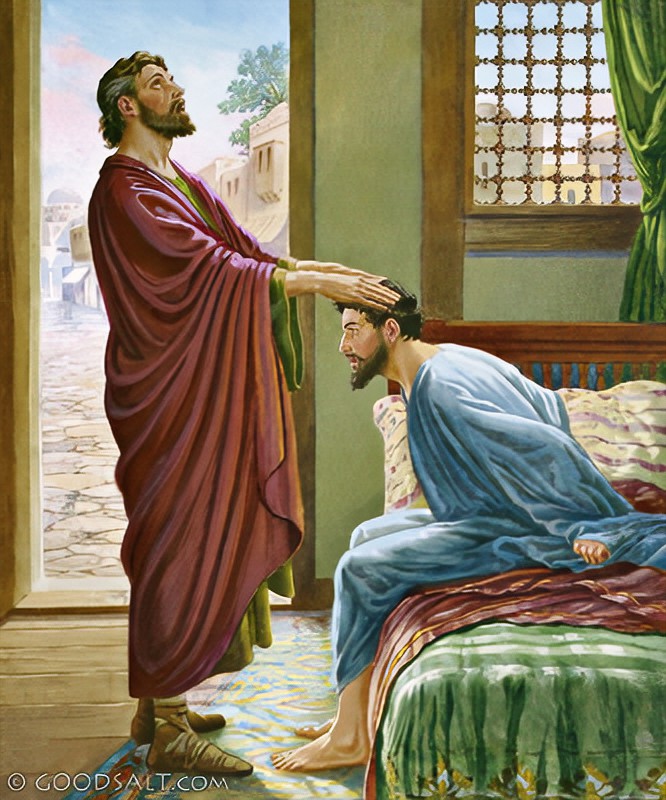
Ananias was then obedient to the call of God on his life. by going to Straight Street, to the house of Judas, and finding Saul of Tarsus laying on the bed. With great courage Ananias entered the home and called Saul "Brother Saul" meaning he believed Saul was already converted to Christ and was ready to receive hands laid upon him for his healing.
- Ananias then announced to Saul that Jesus had come to him telling him about his experience on the road to Damascus, and he was there to pray for him to receive his sight back and be filled with the Holy Spirit. Immediately, Saul was ready to receive.
- As Ananias laid hands upon his head, the scales fell off of Saul's eyes and he regained his sight immediately and was filled with the Holy Spirit
- Saul, as the Apostle Paul, wrote years later to the Corinthian church that he spoke in tongues more than they did, we have reference here that Saul received the baptism of the Holy Spirit with the evidence of speaking in tongues when Ananias laid his hands upon him in prayer.
- Many Christians have assumed Saul was baptized in water at this time; however, this verse does not state that. It states he was baptized and filled with the Holy Spirit.
19 So when he had received food, he was strengthened. Then Saul spent some days with the disciples at Damascus.
Saul then nourshed himself with food and Ananias was probably the one who brought Saul to meet some other disciples and spend time in fellowship with other believers. They were, however, very skeptic of him.
Saul Preached Christ
20 Immediately he preached the Christ in the synagogues, that He is the Son of God. 21 Then all who heard were amazed, and said, “Is this not he who destroyed those who called on this name in Jerusalem, and has come here for that purpose, so that he might bring them bound to the chief priests?” 22 But Saul increased all the more in strength, and confounded the Jews who dwelt in Damascus, proving that this Jesus is the Christ.
On the next Sabbath Saul went to the synagogue as he usually did to worship God. He gave testimony of what happened to him, and preached that Jesus is the Son of God. Because Saul was a skilled student of the great rabbi Gamaliel, he took advantage of the synagogue custom that invited any able Jewish man to speak from the Scriptures at synagogue meetings. As such, he took advantage of this opportunity. The people of the synagogue, however, were fearful of him, but eventually, Saul's testimony and witness for Christ began to bring people to believe that Jesus was their long-awaited Messiah.
Interlude
It is at this point in history that Saul went away to Arabia for close to three years to be ministered to by the Holy Spirit. This is not mentioned here in the Book of Acts, however, Saul (the Apostle Paul) speaks of it in Galatians, chapter 1:13-18.
- Gal 1: 13-18 13 For you have heard of my former conduct in Judaism, how I persecuted the church of God beyond measure and tried to destroy it. 14 And I advanced in Judaism beyond many of my contemporaries in my own nation, being more exceedingly zealous for the traditions of my fathers. 15 But when it pleased God, who separated me from my mother’s womb and called me through His grace, 16 to reveal His Son in me, that I might preach Him among the Gentiles, I did not immediately confer with flesh and blood, 17 nor did I go up to Jerusalem to those who were apostles before me; but I went to Arabia, and returned again to Damascus. 18 Then after three years I went up to Jerusalem to see Peter, and remained with him fifteen days.
Saul was well-trained in Judaism under Gamaliel the Pharisee, but now he needed to be saturated with the Holy Spirit (Jesus) in orderly to be used effectively for the Kingdom of God as an apostle of Jesus Christ. As we look back over that past few days in Saul's life, suddenly, in a moment of time, Jesus became real to him on the road to Damascus, laid for three days blind waiting for Ananias to lay hands on him for his healing and then he received baptism of the Holy Spirit. He, however, was still unprepared to take the Gospel of Jesus Christ to the Gentile world. God needed to take all those years of knowledge he gained from the Scriptures (Old Testament) under the Great Gamaliel, and then he needed to receive revelations of truth from God's heart for him to go to the Gentile world, just as God had ordained within him. So for three years, Saul saturated himself in prayer as God' revealed Jesus to him over and over alone in Arabla while God prepared him for the work of the ministry.

As pointed out in chapter 8, Saul was only 26 years old at the time he oversaw the stoning of Stephen. He was a "trainee" called a Pharisaic talmadin, which means disciple, of the Great Rabbin Pharisee Gamaliel. The official time of any talmadin to enter into the ministry, according to the Mosaic Law was 30 years of age. It was now some months later when Saul was in Damascus to where Saul probably had turned 27 year of age, but as a Jew, he was still too young to enter into the ministry. This was the ideal time for Saul to slip away from Damascus for three years to be trained by the Holy Spirit for the work of the ministry. When returning, he could then officially become a Pharisee to be used by the Jews, and now able to preach the Gospel to the Gentiles, and still be a Jew who followed the Mosaic Law. Between Saul's years of rabbinical training and three months away quietly to learn from Jesus (Holy Spirit), Saul, now 30 years of ago, according to Mosaic Law was now ready to enter into the ministry.
Jesus, as a Jew, had to wait until He was 30 years old until He officially could enter into the ministry
Saul then returned to Damascus, where he had earlier been accepted by the believers, to continue on in ministry, but now officially, he was ordained and qualified by God to enter into the ministry for the Kingdom of God.
Saul Escapes Death
23 Now after many days were past, the Jews plotted to kill him. 24 But their plot became known to Saul. And they watched the gates day and night, to kill him. 25 Then the disciples took him by night and let him down through the wall in a large basket.

"Many days" speaks of an unknown time, but according to all that we know so far, and according to A Christian Chronology that time was now 40 A.D. Saul had returned from Arabia and was preaching and teaching the Gospel at every opportunity to Jews and Gentiles throughout the city. A plot, however, among the Jews became known to Saul that they were out to kill him. Saul now was the persecuted instead of the persecutor. The gates of the city were watched continuously for him to go in or out, which many Jews were seeking to have killed him if they were able. To avoid being caught, the disciples in Damascus put Saul in a large basket and lowered him down from the city wall far away from the gate so that he could escape.
He was now ready to go to Jerusalem.
Saul in Jerusalem
26 And when Saul had come to Jerusalem, he tried to join the disciples; but they were all afraid of him, and did not believe that he was a disciple. 27 But Barnabas took him and brought him to the apostles. And he declared to them how he had seen the Lord on the road, and that He had spoken to him, and how he had preached boldly at Damascus in the name of Jesus.
Even though it had been over three years since Saul left Jerusalem to head up to Damascus to bring back believes in that city to have them imprisoned for their faith, Saul had terrible reputation to where the believers in Jerusalem didn't believe that he had become a believer when he tried to hook up with the disciples in Jerusalem. They were very much afraid of him.
Barnabas, who we learned was one of the seventy who followed Jesus in His earthly ministry, had become a leader within the Church. He was not, however, one of the apostles, but he did carry great favor with them. Barnabas probably had gotten word back from Damascus of Saul's conversion and how he was preaching the Gospel of Jesus Christ to the people there, and as such, believed Saul and took him to see the apostles so they could ask him questions and find out for themselves whether he was genuine or not.
.jpg)
When with them, Saul declared his conversion experience with Jesus on the road to Damascus. He probably told him how he was blind for three days, Ananias laying hands on him for healing, and was baptized in the Holy Spirit, with the evidence of speaking in tongues. He spoke of his time away in Arabia, being ministered to by the Holy Spirit to make sure the apostles knew he was not trained by the disciples in Damascus, but that he received revelation by Jesus Christ Himself. Then he spoke of how he joined the other disciples in Damascus and boldly witnessed the Gospel for Jesus Christ to the people of that city.
The apostle believed and rejoiced that his faith was genuine, and they all believed in the one true Gospel together, and that God had specifically called him into the ministry for the Kingdom of God. He was welcomed into the faily of the followers of Jesus Christ.
28 So he was with them at Jerusalem, coming in and going out. 29 And he spoke boldly in the name of the Lord Jesus and disputed against the Hellenists, but they attempted to kill him. 30 When the brethren found out, they brought him down to Caesarea and sent him out to Tarsus.
Saul then joined the apostles as they all went about the city witnessing Jesus for the Kingdom of God. It didn't take long, however, for the Jews to find out what had happened to Saul, seeing him as a betrayer to the Jewish faith, and they attempted to kill him. For his own protection, the apostles then brought Saul down to Caesarea to where he boarded a ship bound for Tarsus, his hometown.
Whenever leaving Jerusalem, which was up on Mount Zion, going anywhere was always referred to as going "down,"
because one had to go down the Mount of Zion first before traveling to one's destination.
This kind ofs persecution and assassination attempts would become a recurring pattern in Saul's the rest of his life.
A Time of Peace and Prosperity for the Church
Saul remained in isolation tuck away in Tarsus for many years until God would bring about events that would call him back into the ministry. Saul was no longer a threat both to the believers, or even the angry Jews who thought of him as a betrayer. Things quieted down in Jerusalem, and extended throughout Judea, Galilee, and Samaria to where peace and prosperity came to the Church for a period of time as those believers left in Israel continued on spreading the Gospel of Jesus Christ, and continued to minister to one another.
31 then the churches throughout all Judea, Galilee, and Samaria had peace and were edified, And walking in the fear of the Lord and in the comfort of the Holy Spirit, they were multiplied.
The Healing of Aeneas
According to A Chronology of Biblical Christianity, the year was now 40 A.D. and Ignatius had suceeded Peter as the head over the Church at Antioch. Peter was now more free to do missionary work, so he went back to Judea minister the Gospel.
32 Now it came to pass, as Peter went through all parts of the country, that he also came down to the saints who dwelt in Lydda. 33 There he found a certain man named Aeneas, who had been bedridden eight years and was paralyzed. 34 And Peter said to him, “Aeneas, Jesus the Christ heals you. Arise and make your bed.” Then he arose immediately. 35 So all who dwelt at Lydda and Sharon saw him and turned to the Lord.

The Apostle Peter traveled on foot around Judea ministering the Gospel and then came to the believers living in Lydda, was about 35 miles from Jerusalem.

Coming to Lydda, a man by the name of Aeneas was brought to Peter on a mat who had been paralyzed and bedridden for the past eight years. Peter called him by name stating clearly, "Aeneas, Jesus the Christ heals you. Arise and make your bed," or as other version state, "roll up your mat." Aeneas immediately got up and did as Peter declared. Notice, two things: Peter called Aeneas by name, not knowing who he was, and Peter did not pray over him. He called out to him to get up, in the same way Peter spoke to the lame man at the Gate Beautiful in Acts, chapter 3. As a result, all who witnessed this miracle responded by turning to Jesus Christ, coming into the Kingdom of God. As Peter continued throughout Lydda and Sharon, rumor had spread wide regarding Aeneas' healing to where many more people came to the saving knowledge of Jesus Christ.
Dorcas Restored Back to Life
Peter continue to minister wherever the Holy Spirit led him. He met two men who had purposely come to him asking him to come to the home of Tabitha (Dorcas) who was a believer who had just died, with hopes that Peter could comfort the family. Since Joppa was nearby, on the sea coast of the Mediterrean Sea, Peter agreed to go to her.
36 At Joppa there was a certain disciple named Tabitha, which is translated Dorcas. This woman was full of good works and charitable deeds which she did. 37 But it happened in those days that she became sick and died. When they had washed her, they laid her in an upper room. 38 And since Lydda was near Joppa, and the disciples had heard that Peter was there, they sent two men to him, imploring him not to delay in coming to them. 39 Then Peter arose and went with them. When he had come, they brought him to the upper room. And all the widows stood by him weeping, showing the tunics and garments which Dorcas had made while she was with them.
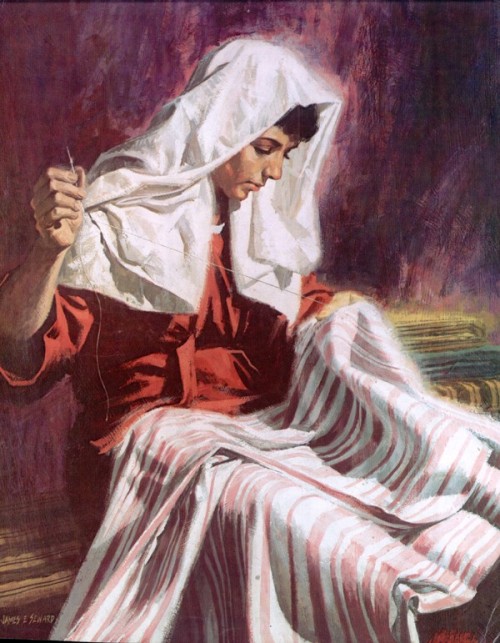
Tabitha was a widow who was a believer and follower of Jesus. She was a very giving lady, full of good works, as well as a talented lady in handiwork. She, however, had just died, and her loved ones and washed her and prepared her for burial. They then laid her in the upper room of the home to await her emminent burial. They then laid out all the beautiful handiwork she had done for display for others to see before her burial. Wailing women stood by, as was custom, weeping, and showing off Tabitha's handiwork. When Peter came to the home of Tabitha, he went up into the upper room to witness all of the commotion of the wailing women and others over the body of Tabitha.
Jewish law has always been to bury their dead within three days. The dead was quickly washed, bound and was buried.
40 But Peter put them all out, and knelt down and prayed. And turning to the body he said, “Tabitha, arise.” And she opened her eyes, and when she saw Peter she sat up. 41 Then he gave her his hand and lifted her up; and when he had called the saints and widows, he presented her alive. 42 And it became known throughout all Joppa, and many believed on the Lord.
Peter immediately told every to leave that upper room! When they had gone downstairs, Peter knelt down and prayed to God to raise her from the dead. Peter, remembering and watching Jesus raise people from the dead (Mark 5:38-43), and also remember Jesus telling his disciples that even greater things could be done by them (Jn 14:12) - all in the name of faith, Peter then turned to Tabitha's dead body and spoke firmly out, "Tabitha, arise." Tabitha immediately opened her eyes. When she saw Peter, she sat up. Peter then took her hand and lifted her up. She had been raised from the dead - resuscitated back to life.
Peter then called the believers and the wailing widows waiting in the room below to come up. There Peter presented Tabitha alive, and all rejoiced.
43 So it was that he stayed many days in Joppa with Simon, a tanner.
This kind of news travels fast, as it spread all around Joppa, and as a result, many people came to believe on Jesus as the Christ. Peter then stay on in Joppa for several days at the home of Simon, the tanner, whose house was right on the sea.
This concludes chapter 9.
Click here for Acts - Chapter 10
God bless
Pastor Joyce Erickson
Believersbibleschool.com






